
Iran Must Break the Taboo of Negotiating With America for the Sake of Public Health
The editorial of Setareh Sobh lists the reasons why Iran must start negotiations with the United States amid the coronavirus crisis as this might help alleviate the suffering of the Iranian people.
US President Donald Trump recently said that if Iran wishes, he is ready to send relief aid to fight the coronavirus disease. This is not the first time that Trump has made such a proposition following the coronavirus outbreak; earlier he had said that he is ready to lift sanctions if Iran asks for it.
Iran should verify Trump’s remarks and see if he is really ready to fulfill his promises. Countries like Oman, Japan, and France have tried to mediate between Iran and the United States; they can now help Iran to verify Trump’s claims. Through the UN Secretary-General who has called for the lifting of sanctions, Iran can see if Trump is really ready to alleviate the sanctions and pave the way for Iran to access its assets in foreign banks.
Iran accessing goods and medical supplies is not very difficult; what is really difficult for Iran is not having adequate resources to address the damage caused by the coronavirus outbreak. The Iranian government doesn’t have access to its foreign currency resources; at most it has used domestic resources including loans from the Central Bank, and withdrawals from the National Development Fund. As such, it cannot provide individuals, companies, and different groups with what they need.
This requires decreasing sanctions. Under these circumstances, the Iranian president must take a step forward by verifying Trump’s claims. Particularly now because global public opinion and many governments are prioritizing the fight against the coronavirus crisis, while not allowing political conflicts to cast a shadow on this humanitarian crisis. The United States must be asked to show its good faith in practice. Iran too must break the taboo of negotiating with America and use diplomacy to benefit the Iranian people.
The Next Parliament’s Priority: Politics or Economy?
The editorial of Jahan Sanat says that instead of playing politics, the next Parliament must prioritize solving the economic problems plaguing Iran, given the existing and future difficult challenges facing the country.
It cannot be denied that the country is not in good condition. Volatility in the international economy, particularly in the oil market along with US sanctions, and the consequences of the coronavirus outbreak are all signs of this. Because of the unity created to contain the coronavirus disease, political conflicts within the Iranian establishment have become less significant. However, politicians are planning for positions in the next Parliament that will be established in June.
A look at the structure and configuration of the next Parliament indicates a younger average age, higher educational qualifications, and the presence of those who used to hold important positions (ministers, governors, mayors of metropolises). These features, along with the difficulties and challenges, have increased public expectations for a strong Parliament.
But the formation of coalitions incorporating different political and factional viewpoints does not seem promising. Politicians are still trying to obtain important positions so that they can appoint members of their own factions and groups to other important positions. There is no sign of any efforts to form coalitions between parties with different viewpoints.
Given the fact that the Iranian supreme leader has called this year a “leap in production” and in light of the tough economic conditions in the country, it is obvious that priority must be given to economic issues.
The Parliament that is being formed must give priority to the economy, thus allowing it to become popular.
Mr. President, Accept the Realities; We Are not in Good Condition
The editorial of Setareh Sobh asks why the Iranian government is not telling the truth to the people with regard to the deteriorating economic conditions in Iran.
Iran has long been subject to an unfortunate political practice: officials try to depict positive conditions in the country about the economy and living conditions. However, the reality and field observations indicate a different story.
According to statistics and Iranian officials’ remarks, economic growth in Iran in 2018 and 2019 has been negative. When economic growth is negative, it means that the country’s economy has shrunk. For example, 3 percent negative growth means the economy and livelihoods have become 3 percent smaller. The World Bank and IMF have predicted that Iran’s economic growth will be minus 6 percent for 2020. Officials can express doubts regarding these reports, but then they have to announce the real economic growth.
The Iranian president has said that the “virus of sanctions” is worse than coronavirus. The outbreak of coronavirus has strongly impacted all countries including Iran. Under these circumstances, we can see that all governments in the world are under the pressure of coronavirus. How come the Iranian government claims that everything is okay, despite the coronavirus and the sanctions?
Mr. President, as someone who is elected by the people, you are accountable to them. You have to tell people the realities, and explain why the “hardliners” helped in disrupting the nuclear deal and why they created obstacles for passing the FATF bills, as a result of which financial transactions between Iranian banks and the world have been disrupted.
With the outbreak of coronavirus, there was a plunge in oil prices. As such all national economies including Iran’s have severely suffered to the extent that 23 members of OPEC and two non-OPEC members had to decrease selling oil by 10 million bpd. Iran’s situation in selling oil is worse than other countries because of the US sanctions. So when businesses are either closed or half-closed due to coronavirus, how come the president says that “we are in good condition?”
Under these circumstances, there are two viable solutions: alleviating tensions with the United States by using the pretext of the coronavirus disease. Or asking institutions under the Iranian supreme leader that haven’t paid taxes for decades to help the people under these dangerous conditions.
Crisis Management in Containing Coronavirus
The editorial of Eskenas points to the Iranian government’s incompetence in dealing with crises, including the coronavirus disease.
Throughout the world, coronavirus has impacted both the poor and the rich. From the early days of the outbreak of coronavirus, many experts and economists did their best to take proper measures, and offered suggestions to the Iranian government. Considering the experiences of other countries, we can say that coronavirus shocks both supply and demand.
Coronavirus is different from other crises in the sense that when people leave their homes, they pose a risk to themselves and to society. Coronavirus crisis has created new risks for investment and production, creating challenges for many producers and suppliers – particularly for those that were in regular contact with the public (i.e. tourism).
Iran is not only dealing with the coronavirus crisis; it is also struggling with US sanctions and international restrictions. Foreign pressure is important, but more significant is the problem in decision making and economic inefficiencies.
Ironically, these inefficiencies have created a series of opportunities that, if used properly, can create a big leap for the country. Many advanced countries in the world do not suffer from these inefficiencies. So their experiences can be used to scrutinize and reform Iran’s domestic economic inefficiencies.
The coronavirus crisis has three stages: emergency, recovery, and adjusting to the new situation. Each stage must have proper mechanisms which must be implemented. The problems that have challenged Iranian families are the ones that have created challenges for the government as well. For example, the government’s oil revenues are now cut to one sixth, and the government cannot count on taxes. So the government’s lack of resources must be taken into account along with livelihoods.
To better support those who have been affected by coronavirus, there is good infrastructure such as the Iran Data Portal. This database – which holds the data of Iranian citizens – can be used in many projects to improve government performance.
It seems that the government’s reaction to crises including the coronavirus crisis has not been comprehensive, and there has been no mechanism to effectively fight corruption.

Khamenei’s Personal Physician to Rouhani: Reopen Shrines and Mosques
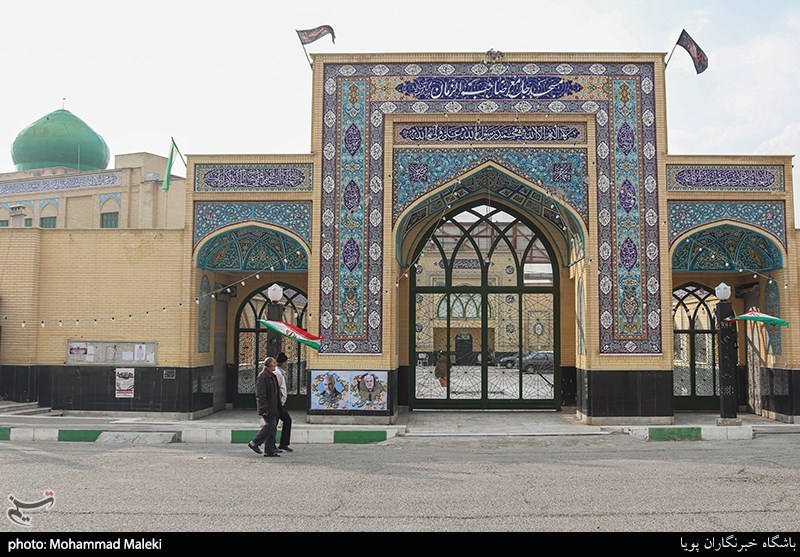
Ali Reza Marandi, the trusted physician of Iran’s Supreme Leader Ali Khamenei, has written a letter to President Hassan Rouhani, urging him to reopen shrines and mosques “one of these days.”
Marandi, referring to the beginning of Ramadan, asked Rouhani to issue an order to reopen “at least the courtyards of holy shrines and mosques to devout people one of these days while observing health regulations and social distancing.”
In his letter, Marandi also requested Iran’s president to provide short-term training on health issues for seminary students who are to be sent to different cities in the country to promote religion.
Ali Reza Marandi is Ali Khamenei’s personal physician and one of his advisers on health issues. His letter to Rouhani was published at the same time when the judiciary’s spokesman Gholam Hossein Esmaili noted that mosques and religious centers could resume their activities.
This recommendation goes against health experts’ warnings that easing restrictions of social distancing might result in the resurgence of coronavirus cases and more deaths.
Coronavirus Infections Are Much More Than the Official Number, Says Head of Tehran’s City Council
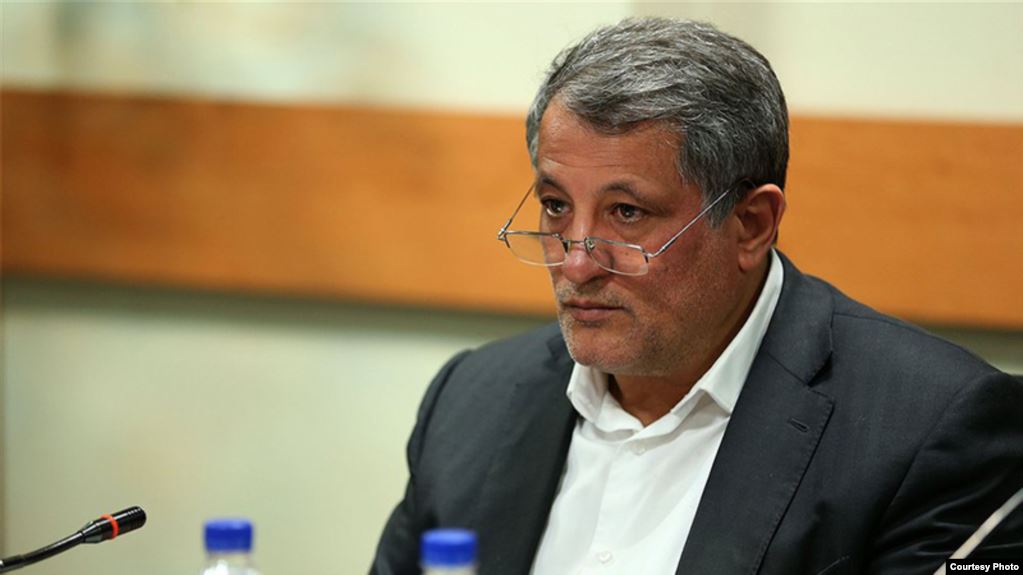
Mohsen Hashemi, head of Tehran’s City Council, said that based on the statistics of Iran’s Parliament Research Center and experts’ views, coronavirus cases are much more than the officially announced number.
Talking at Tehran City Council’s public session, Hashemi stressed that the Health Ministry also admits to the discrepancy in statistics. He added that the main reason for the difference between official statistics and the real ones is due to the delay in announcing the outbreak of coronavirus in Iran and not considering the number of victims who lost their lives before the outbreak was announced. These lives were lost at a time when there was still not enough testing done in the country – as a result of which victims were classified under different diseases such as respiratory problems.
The Head of Tehran’s City Council has also asked for Tehran’s statistics to be announced separately. Warning about lifting restrictions hastily, Hashemi emphasized that easing restrictions might result in the coronavirus returning.
Earlier, the health minister’s deputy, Alireza Raisi, mentioned not having the exact death toll in the country, adding that, “it is absolutely right that we have several times more deaths than what is announced.”
Nahid Khodakarami of Tehran City Council had said in an interview that the best case scenario every day was 70 people dying from COVID-19 and the worst case scenario was more than 100.
According to the estimate by the Tehran City Council member, roughly 6,000 people have lost their lives only in this city.
The accuracy of statistics announced by the Iranian government has been questioned by the US administration.
75 Percent of Healthcare Workers Concerned About Lack of PPE
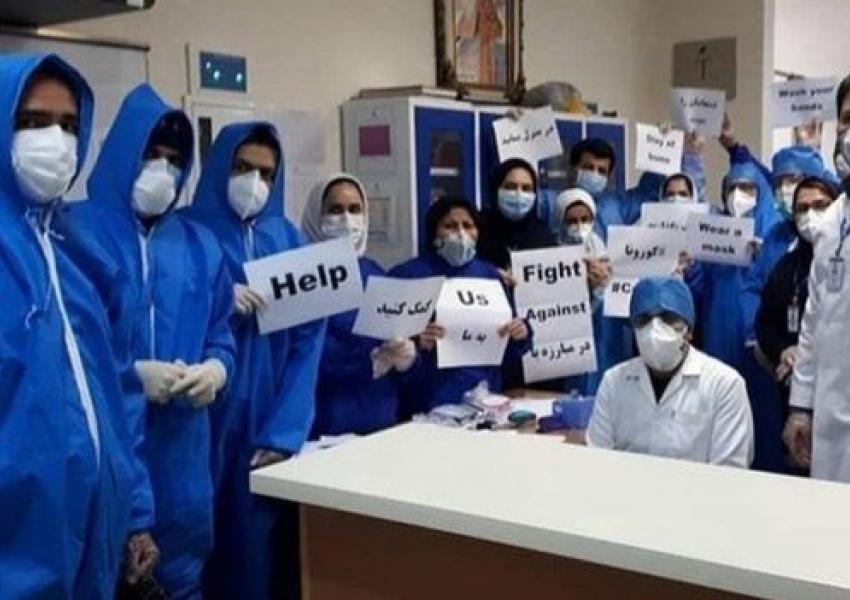
An internal study of Iran’s Health Ministry shows more than 70 percent of healthcare workers in hospitals and treatment centers in Iran complain about lack of personal protection equipment (PPE) and masks, while being under increasing mental pressure.
The study shows that more than 77 percent of healthcare workers are thinking of quitting their jobs due to mental pressure. At least 70 percent of the participants in the study expressed concerns over not having PPE and 75 percent said they don’t have enough masks.
Iranian senior officials have claimed in recent days that there is no shortage of PPE or medical supplies in the country. Iranian President Hassan Rouhani has stated that since the outbreak of coronavirus in Iran, there have been no shortages in hospitals, foods and medicines.
The Health Ministry’s study shows that as a result of shortages in PPE, 60 percent of healthcare workers think they might be carriers of the disease.
Given the work pressure and existing difficulties, more than 62 percent of healthcare workers think that their jobs and services are not appreciated enough.
In the meantime, following the report about mental and psychological problems among Iran’s medical personnel after the coronavirus crisis, Iran’s Health Ministry said nurses will receive psychiatric counselling.
The Deputy Health Minister for Nursing, Maryam Hazrati, said that her ministry’s investigation shows increasing exhaustion and depression among nurses.
Drop in Income of 50 Percent of Iranians due to Coronavirus
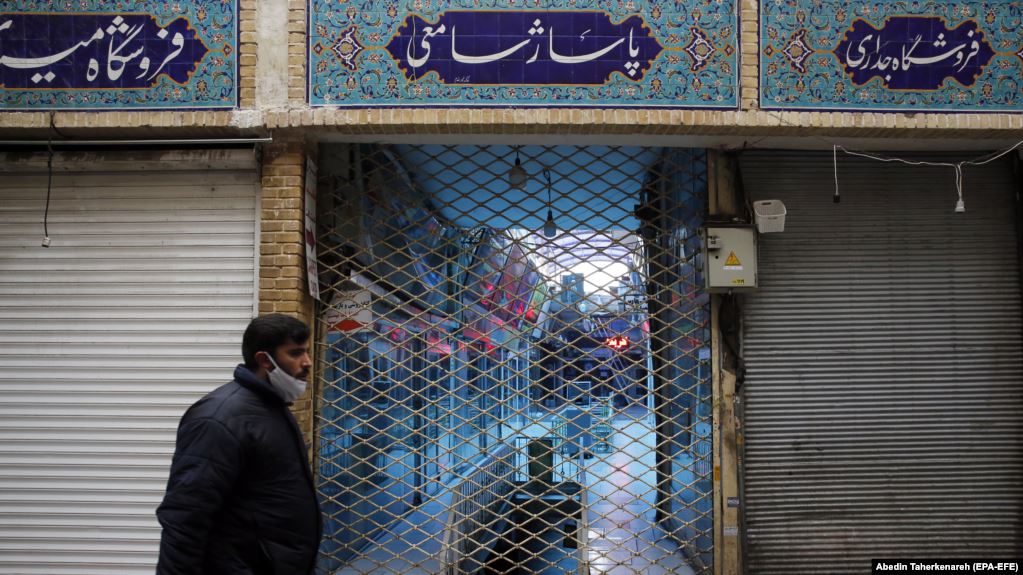
The result of a poll in Iran shows that the outbreak of coronavirus has had a negative impact on incomes of more than 50 percent of Iranians.
Iranian Students Polling Agency (ISPA) – which held the nationwide poll between April 12 to April 15 – says that the income of 50.7 percent of respondents has decreased. According to ISPA, 41.7 percent of participants in the poll said their businesses have been closed due to the coronavirus outbreak, while 13.5 percent have lost their jobs.
Only 26.3 percent of participants said their economic conditions have not changed, while there has been an improvement in the economic conditions of 0.6 percent of participants since the coronavirus disease.
Earlier, the Iranian government’s spokesperson Ali Rabiei had written in an op-ed that as a result of the coronavirus crisis, more than 7 million people are at risk of losing their official or unofficial jobs.
According to the latest official statistics in Iran, the death toll due to coronavirus has reached 5,118 – which is said not to reflect the real number of victims. The Iranian government, however, has issued an order to resume economic activities – a decision criticized by many.
The critics say that resuming economic activities will endanger more people, while accelerating the spread of the disease.
According to the IMF’s prediction, due to coronavirus in Iran, the rate of inflation will reach 34 percent and unemployment will be at 16 percent.
Iran’s Judiciary Chief Criticizes the Government for not Reforming “Corruption-Generating Structures”
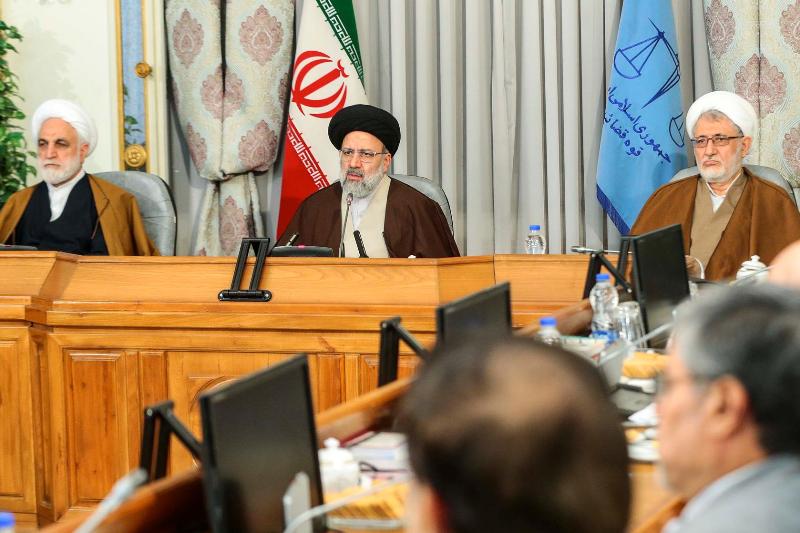
“We have repeatedly said that the government should reform the corruption-generating structures,” said Iran’s judiciary chief Ebrahim Raisi, referring to the $4.8 billion which went missing after being distributed among importers by the government.
The Supreme Audit Court of Iran (SAC) published a report on April 14 saying that $31 billion had been given to importers in 2018 but $4.8 billion is missing.
Iran’s government distributes billions of dollars – at the official rate of 4,200 tomans per dollar, much cheaper than the free market rate – among local importers to purchase essential goods from overseas. However, according to the latest SAC report, $4.8 billion was distributed in 2018, but no goods and products were imported.
In his speech, Raisi criticized those who evade supervision, noting, “everyone should welcome supervision and transparency.” He also pointed out that people should be informed of the fight against corruption and the return of money to the country’s treasury.
He also stated that the prosecutor’s office is investigating the cases of those individuals who had received foreign currency at the government rate, adding that some sentences have been issued in this regard.
Following the SAC report, President Hassan Rouhani said it was “100 percent wrong,” while accusing this organization of “total ignorance” about the country’s laws and regulations. Moreover, the Governor of the Central Bank of Iran, Abdolnasser Hemati, reacted to this report by saying the importers did not fulfill their commitments “only on $1.5 billion” not $4.8 billion.
Lawmaker Sentenced to 21 Months in Prison
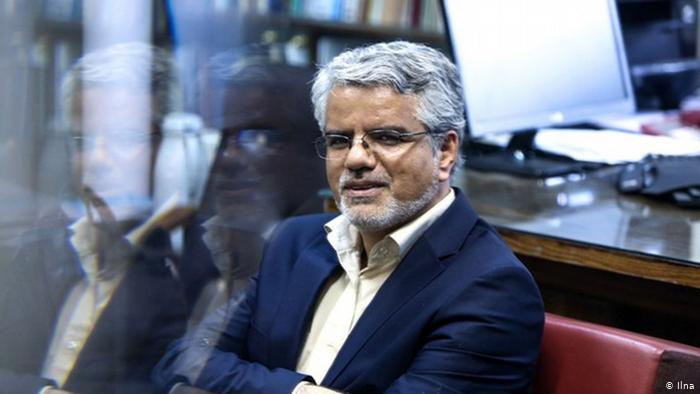
Following former Chief Justice Sadegh Larijani’s lawsuit against MP Mahmoud Sadeghi, the court sentenced the lawmaker to 21 months in prison and a cash fine. The sentence was issued in February and is now in the appeal court.
Sadeghi told ISNA that due to the coronavirus crisis in the country, he didn’t want to publicize this news, emphasizing that he doesn’t know how this has leaked to the media. He did not explain the link between the coronavirus outbreak and his sentence. Tehran’s MP added that he has objected to the sentence and his case is now in the appeal court.
Larijani’s lawsuit against Mahmoud Sadeghi goes back to 2016 when the lawmaker had asked Larijani to make clarifications about his personal accounts. The former chief justice was said to have 63 personal accounts with an annual interest of 250 billion tomans at that time.
Following Sadeghi’s remarks on this in 2016, the prosecution office pressed charges against him back then.
According to Iran’s Constitution, Iranian lawmakers have immunity against prosecution and arrests.
